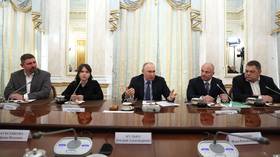
The Russian president addressed the current offensive, long-term goals, and whether a new mobilization is needed

Russian President Vladimir Putin meets with military correspondents at the Kremlin, June 13, 2023. © The Kremlin/Handout
The goals of Moscow’s military operation in Ukraine have not changed and are in fact being served by Kiev’s latest offensive, Russian President Vladimir Putin told a gathering of war correspondents at the Kremlin on Tuesday.
Putin also addressed Ukraine’s glorification of Nazi collaborator Stepan Bandera, the ongoing fighting on the southern front, and the fallout from the Kakhovka Dam disaster, among other things.
Moscow’s objectives remain unchanged
The goals laid out in February 2022 are “essential” and while some details are subject to change based on the developing situation, they remain fundamentally the same, Putin said. Demilitarization of Ukraine is happening “gradually and methodically,” with Kiev’s troops now entirely reliant on Western weapons, equipment and ammunition, unable to produce anything locally. There has been progress on protecting the people of Donbass, though Ukraine continues to bombard them. If Kiev’s drone strikes and incursion continue, Moscow may consider setting up a “buffer zone” in Ukrainian territory, to keep them out of range. “No fundamental changes have taken place today in terms of the goals that we set for ourselves at the beginning of the operation,” Putin said.
Progress of Ukraine’s offensive
Kiev launched a large-scale offensive on June 4, using the troops and equipment provided by the West, but without success in any sector. “They’re taking heavy casualties. Greater than ours” by a factor of ten, said the Russian president. Equipment-wise, Ukraine has already lost up to 30% of what the West has provided, including three times as many tanks as Russia.
Why Russia is not like Ukraine
“We are a government of laws, they behave like a regime based on terror,” Putin said in response to a question about introducing martial law to deal with assassinations of journalists and public figures such as Darya Dugina and Vladlen Tatarsky, or the attack on Zakhar Prilepin. Russia “cannot use terrorist methods,” but will step up the work of security services to counter Kiev’s plots, he said, adding that there is no need to introduce martial law.
Will there be another mobilization?
More troops will be needed if there is a decision to march on Kiev, but not under the current circumstances, the Russian president said. On top of the 300,000 reservists called up last fall, more than 150,000 people have signed up for contract service, at a rate of 9,500 a week. Conscripts doing their regular service have also seen battle in Belgorod, and acquitted themselves admirably.
On the role of industry in the conflict
Russia began overhauling its defense industry eight years ago, but the conflict made clear the remaining shortcomings, Putin said, such as the availability of drones. Since the start of hostilities, the Russian industry has increased production up to tenfold for certain systems, with some companies operating in three shifts. Meanwhile, Ukraine’s capabilities have been almost entirely eliminated and they depend entirely on the West. The West doesn’t care if their weapons deliveries violate laws, and have not yet realized they will never achieve their objectives when it comes to Russia. “They will have to understand that. I think they gradually will,” Putin said.




